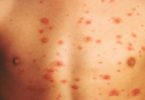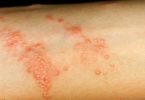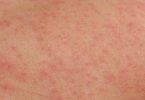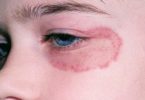
What's in this article?
What is Herpes simplex virus?
The herpes simplex virus, also known as HSV, is an infection that causes herpes. Herpes can appear in various parts of the body, most commonly on the genitals or mouth. There are two types of the herpes simplex virus. HSV-1, also known as oral herpes, can cause cold sores and fever blisters around the mouth and on the face. HSV-2 is generally responsible for genital herpes outbreaks.
read more: Herpes simplex: Symptoms, Causes, Risks Factors & Treatments
Symptoms of Herpes simplex
Many people who get the virus that causes herpes never see or feel anything. If signs (what you see) or symptoms (what you feel) occur, a person may experience:
- Tingling, itching, or burning: Before the blisters appear, the skin may tingle, itch, or burn for a day or so.
- Sores: One or more painful, fluid-filled blisters may appear. Blisters break open and often ooze fluid and form a crust, before healing. The first time sores appear, they will show up between 2 and 20 days after a person has contact with an infected person. The sores can last from 7 to 10 days. Where the sores appear often varies with type:
- Oral herpes (HSV-1): Most blisters appear on the lips or around the mouth. Sometimes blisters form on the face or on the tongue. Although these are the most common places to find oral herpes, the sores can appear anywhere on the skin.
- Genital herpes (HSV-2): Sores typically occur on the penis, vagina, buttocks, or anus. Women can have sores inside the vagina. Like oral herpes, these sores can appear anywhere on the skin.
- Flu-like symptoms. Fever, muscle aches, or swollen lymph nodes (glands) in the neck (oral herpes) or groin (genital herpes) are possible.
- Problems urinating. People (most often women) with genital herpes may have trouble urinating or have a burning feeling while urinating.
- An eye infection (herpes keratitis). Sometimes the herpes simplex virus can spread to one or both eyes. If this happens, you can have pain, light sensitivity, discharge, and a gritty feeling in the eye. Without prompt treatment, scarring of the eye may result. Scarring can lead to cloudy vision and even loss of vision.
If you develop signs and symptoms of herpes simplex, you can expect to have these for as long as listed below:
- Oral (mouth) herpes: 2 to 3 weeks
- Genital herpes: 2 to 6 weeks (the first outbreak)
read more: Easiest way to treat Herpes simplex
How is The Diagnosis Made?
Your doctor will usually diagnose a herpes infection through visual examination of the sores. Laboratory tests are available and can be used to confirm the diagnosis, although they are not always necessary. In these tests, a tissue scraping of the sores may be examined under the microscope, or a blood test is given. In the case of brain infection, an electroencephalogram (EEG) and imaging studies may be done to help with the diagnosis. In addition, a lumbar puncture (spinal tap) will be done to examine the spinal fluid for signs of infection. Newborns will have a variety of tests performed to look for evidence of viral infection of the brain, lungs, and other organs.
How is Herpes simplex virus Prevented?
People should avoid activities and foods known to trigger recurrences. For example, they people with oral HSV infection should avoid exposure to sunlight as much as possible.
Because HSV infection is contagious, people with infection of the lips should avoid kissing as soon as they feel the first tingling (or, if no tingling is felt, when a blister appears) until the sore has completely healed. They should not share a drinking glass and, if possible, should not touch their lips. They should also avoid oral sex.
People with genital herpes should use condoms at all times. Even when there are no visible blisters and no symptoms, the virus may be present on the genitals and can be spread to sex partners.
Vaccines for the prevention of HSV infections are being developed.
read more: Difference Between Cold Sores and Herpes
How is Herpes Simplex Treated?
Although there is no cure for herpes, treatments can relieve the symptoms. Medication can decrease the pain related to an outbreak and can shorten healing time. They can also decrease the total number of outbreaks. Drugs including Famvir, Zovirax, and Valtrex are among the drugs used to treat the symptoms of herpes. Warm baths may relieve the pain associated with genital sores.
read more: Most Common Genital Herpes Symptoms in Women






Leave a Comment